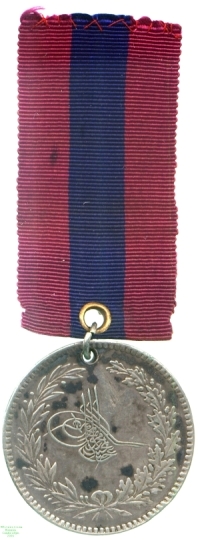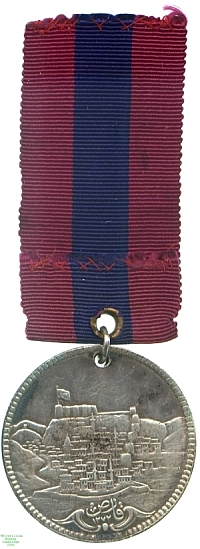
Obverse, the Sultan's royal cipher with two sprays of leaves around

Reverse, a fortress flying a standard in the mountains above a city

Obverse, the Sultan's royal cipher with two sprays of leaves around |

Reverse, a fortress flying a standard in the mountains above a city |
The city of Kars, in north-eastern Turkey, was a possession of the Ottoman Empire between 1378 and 1877, but over the course of the nineteenth century an exposed and strategic position made it a frequent target of Russian attacks. Defended successfully in 1821, it fell in 1828, but was recovered in time to be a target anew in the Crimean War.
The Russians, who were in a dangerous position at the siege of Sebastopol, decided as almost the last gasp of the war to open a new front directly attacking the Ottoman Empire. Kars stood in their path, and withstood a five-month siege. Turkish reinforcements were sent but were used to skirmish with the Russian forces; facing winter without resupply, and with snowfall preventing their relief, the garrison surrendered on 26 November 1855. In the negotiations that ended the Crimean War Kars was transferred to Russia, although it would be recovered for good in 1918.
No dishonour was attached to the 1855 surrender by Sultan Abdul Mejid, and those who had assisted in the city's defence were awarded this commemorative medal. As the garrison had been under British command, and had numbered a few British troops, not all the recipients were Ottoman soldiers, but the great majority were; nearly twenty thousand were issued to Turkish forces and the issues to Turks and non-Turks are not distinct in any way.
It cannot therefore be told to whom this example of the medal was awarded and in what force he served. Although this medal has become part of the Watson Collection, moreover, it is not in Lester Watson's own lists and there is no information about how he may have acquired it.